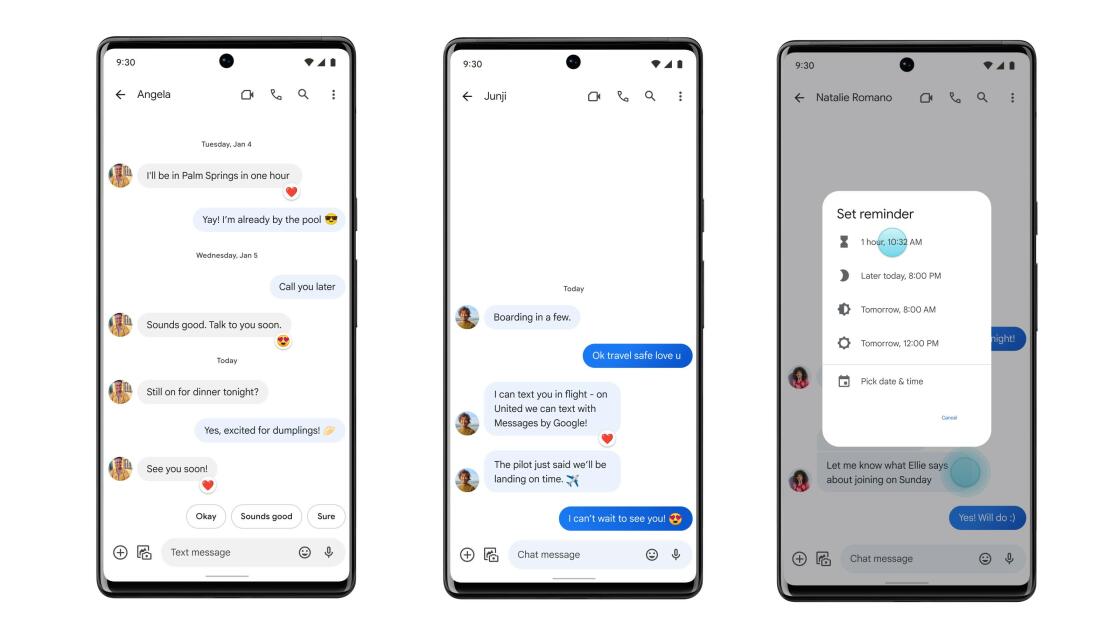Coming updates also include message follow-up suggestions and free inflight texting on United, but Rich Communications Services (RCS) interoperability remains far off.
Google’s Messages app for Android is finally approaching post-literate feature parity with Apple’s Messages app for iOS: It now not only displays the “tapback” emoji(Opens in a new window) sent by iPhone users but lets Android users reply just as quickly with their own value-judgment emoji.
That matches what Google already supports in Android-to-Android messaging with its RCS enhanced-messaging standard and finishes the emoji-interoperability work Google began with a March update(Opens in a new window) that added the ability to display iPhone-sent tapbacks. Before then, Android users would see clunky text transcriptions along the lines of “Laughed at an image.”
Google announced this alongside other updates in a blog post(Opens in a new window) Thursday morning, although 9to5Google reported(Opens in a new window) at the end of September that some users were already seeing this feature on their Android phones. On iPhones, the new tapback appears as a separate text with the emoji sent in the tapback, plus the text responded to in quotes.
Google is also adding message-management features that can help prolific texters stay on top of their short-form banter. The updated app will let you set a reminder directly from a message, suggest scheduling Google Meet video calls or adding calendar appointments when message contents imply a need for either, and offer to highlight messages with a star icon when they contain real-world metadata like phone numbers, street addresses, and door codes.
The message parsing needed for the last two features, like the automatically suggested replies already offered by Messages, doesn’t involve cloud processing of your data.
“Nothing leaves your phone; everything is processed on device in a private and secure way,” said Jan Jedrzejowicz, head of product for Messages by Google, in a press briefing Tuesday.
The updated Messages app also brings in-line YouTube playback, support for automated transcription of audio messages sent in a chat on more phones, and new icons.
And with RCS enabled, Messages will now be free to use from a chair in the sky if that chair is onboard a United Airlines plane, thanks to United adding RCS to a free-messaging tier of inflight Wi-Fi(Opens in a new window) that already includes Facebook’s Messenger and WhatsApp and Apple’s iMessage. Jedrzejowicz said Google plans to bring on other airlines.
As before, messages sent between Android phones with Google’s Messages app are encrypted in transit–the most important upgrade that the wireless-industry-endorsed RCS(Opens in a new window) (Rich Communications Services) brings over plain old SMS and MMS–with one-to-one messages further encrypted end-to-end. In the briefing, Jedrzejowicz said “e2e” encryption for group RCS chats will start rolling out at the beginning of December. But texts between Android and iPhones will continue to fall back to SMS or MMS and be sent in the clear.
As Android and Business Communications vice president and general manager Sanaz Ahari noted in the briefing, Google continues to implore Apple to make RCS the minimum standard for Android-iPhone messaging. But this advocacy has been fruitless; Google’s Silicon Valley neighbor seems content to hope that people will buy iPhones(Opens in a new window) if they resent this privacy gap.
At the same time, though, Google has yet to extend RCS support to its own long-neglected Google Voice service or ship an RCS API that would enable such third-party clients as Signal to support this standard.
Last week, Signal’s developers closed their own privacy gap by dropping SMS/MMS support, writing in a blog post(Opens in a new window) that “letting a deeply insecure messaging protocol have a place in the Signal interface is inconsistent with our values and with what people expect when they open Signal.”
Jedrzejowicz explained the absent API by saying Google hasn’t fully nailed down the RCS specification. “There is still quite a lot of shifting and changing in the underlying protocol,” he said, citing pending developments like implementing end-to-end encryption for group chats. “It’s just a question of maturity.”
He added that Google accepted the need to bring RCS to Google Voice: “We recognize that every messaging app that supports SMS, including Google Voice, should update to RCS, but we don’t have any news today.”
Sign up for What’s New Now to get our top stories delivered to your inbox every morning.
This newsletter may contain advertising, deals, or affiliate links. Subscribing to a newsletter indicates your consent to our Terms of Use and Privacy Policy. You may unsubscribe from the newsletters at any time.
Your subscription has been confirmed. Keep an eye on your inbox!
Advertisement
Rob Pegoraro writes about interesting problems and possibilities in computers, gadgets, apps, services, telecom, and other things that beep or blink. He’s covered such developments as the evolution of the cell phone from 1G to 5G, the fall and rise of Apple, Google’s growth from obscure Yahoo rival to verb status, and the transformation of social media from CompuServe forums to Facebook’s billions of users. Pegoraro has met most of the founders of the internet and once received a single-word email reply from Steve Jobs.
Read Rob’s full bio
Advertisement
PCMag.com is a leading authority on technology, delivering lab-based, independent reviews of the latest products and services. Our expert industry analysis and practical solutions help you make better buying decisions and get more from technology.
PCMag supports Group Black and its mission to increase greater diversity in media voices and media ownerships.
© 1996-2023 Ziff Davis, LLC., a Ziff Davis company. All Rights Reserved.
PCMag, PCMag.com and PC Magazine are among the federally registered trademarks of Ziff Davis and may not be used by third parties without explicit permission. The display of third-party trademarks and trade names on this site does not necessarily indicate any affiliation or the endorsement of PCMag. If you click an affiliate link and buy a product or service, we may be paid a fee by that merchant.

